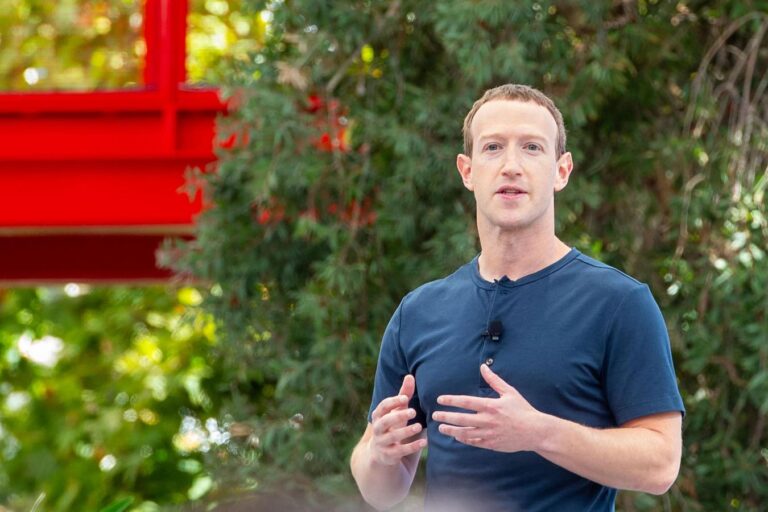September 27, 2023, United States, Menlo Park: Facebook founder and director of Meta Group, Mark Zuckerberg, … [+]
Instagram is ushering in a new era of fan engagement with the launch of its “AI Studio” feature. The groundbreaking initiative, announced by Meta CEO Mark Zuckerberg on his channel last week, allows creators to develop versions of themselves based on AI-powered chatbots. The platform has begun a “preliminary testing” phase in the US, marking a significant shift in how fans can interact with their favorite personalities.
The initial test: a glimpse into the future
Instagram’s ambitious project begins with a carefully curated test involving 50 creators. As Zuckerberg explains, “We’re launching with about 50 creators and we’re going to start rolling it out to a small percentage of people.” This initial phase is crucial because it allows Instagram to refine the technology and gather valuable insights before a broader rollout.
The timeline for this rollout is ambitious, reflecting the urgency and potential impact of this technology. Zuckerberg predicts in a recent interview, “Maybe by the end of July or August, we’ll have this all in hand.” The rapid rollout underscores Meta’s commitment to pushing the boundaries of AI in social media.
The Vision: Personalized Interactions at Scale
The goal of the initiative is to solve what Zuckerberg sees as a fundamental problem in the creator economy: the inability of creators to personally engage with every fan due to time constraints. Zuckerberg articulates this challenge: “It’s the classic problem of not enough hours in the day… I think every creator would like to engage with every fan that reaches out to them, but they just don’t have the time.”
AI-powered characters are designed to bridge that gap, giving fans a way to interact with a version of their favorite creator that embodies their personality, knowledge, and style. As Zuckerberg puts it, “We think people want to interact with a lot of different people and companies, and you need to build a lot of different AI to reflect people’s different interests.”
Technology: More than just chatbots
These AI versions of creators are far more sophisticated than traditional chatbots. They are trained based on the creator’s content, personality, and preferences, with the goal of delivering an authentic and personalized experience. Zuckerberg emphasizes the complexity of this undertaking: “I don’t think we know, until we launch, what the most engaging, most entertaining, most trustworthy formula is going to be.”
For now, AI will primarily interact through messaging, but the potential for expansion into other formats is clear. As the technology evolves, we could see these AI characters participating in video conversations, voice interactions, or even appearing as holograms in augmented reality experiences.
Opportunities and challenges
The potential benefits of this technology are immense. Creators can now deliver personalized experiences to a much larger audience, which can potentially increase engagement and loyalty. Fans, meanwhile, have more opportunities to interact with their favorite creators, even indirectly.
But this new frontier is not without its challenges. Maintaining the app’s authenticity will be crucial. As Zuckerberg points out, “You can teach it to be a little more cautious about certain things or not talk about certain topics that you don’t want it to talk about.” Creators will need to carefully curate and monitor their AI characters to ensure they accurately represent their values and brand.
In a message posted to his channel, Zuckerberg noted that these chatbots will be clearly marked as AI so that users are aware of it.
“We’re rolling out a preliminary test of our AI studio in the US, so you’ll be able to start seeing AI from your favorite creators and AI based on your interests in the coming weeks on Instagram. For now, they’ll mostly appear in posts and will be clearly labeled as AI,” he said.
There is also a risk of misinformation or harmful content if these AI characters are misused or implemented inappropriately. Clear labeling and transparent communication about the nature of these interactions will be essential to maintaining trust with the public.
The wider implications
This move by Instagram could reshape the entire creator economy. It opens up new possibilities for monetization, fan engagement, and content creation. Creators could use their AI characters for market research, content creation, or even to create new forms of interactive content.
Additionally, this technology could democratize the ability to engage large audiences. As Zuckerberg points out, “I think fundamentally it will be accessible and the quality of content will increase as people can play with many more different ideas.”
The Future of Creator-Fan Relationships
The success of this initiative will depend not only on the technology itself, but also on how creators and fans adapt and shape these new forms of interaction.
Zuckerberg’s vision is clear: “We want to give people tools so they can all experiment and… see what works well.” This experimental approach recognizes that we are entering uncharted territory and that the most effective uses of this technology may have yet to be discovered.
As the creator economy continues to evolve, those who can effectively leverage these AI tools while maintaining authentic connections with their audiences stand to thrive. The challenge for creators, platforms, and fans will be to navigate this new landscape thoughtfully, ensuring that technology enhances rather than replaces real human connection.


